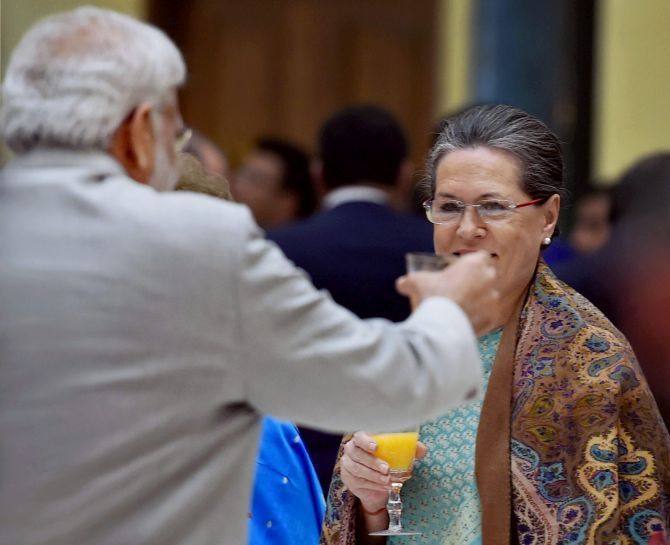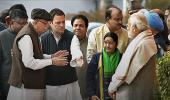'Although the Congress party ethos resembles a court with courtiers, Sonia Gandhi's style was to be consensual.'
Aditi Phadnis looks back at Sonia's tenure as Congress president.

IMAGE: Prime Minister Narendra D Modi toasts then Congress president Sonia Gandhi at the dinner for then US president Barack Obama at Rashtrapati Bhavan, January 25, 2015.
At a rally for the 2001 assembly elections in West Bengal, Sonia Gandhi saw her alliance partner, the Trinamul Congress' Mamata Banerjee, lead her supporters in performing Mexican waves while shouting slogans. Gandhi asked a senior aide, 'Do I also have to dance like this?'
She did not find success easy to come by. There were electoral reverses, and one devastating moment when she staked a claim to form the government, claiming she had the required support of 272 MPs in the Lok Sabha, only to be found embarrassingly short.
She also used a no-confidence motion to pull down the first government led by a BJP prime minister, barely 15 days into its life, only to have the government come back after fresh elections, with greater strength in the House.
It was these days of learning -- especially tricks about parliamentary management -- that saw her forming her opinions about the abilities of various colleagues.
In the Lok Sabha, it was Shivraj Patil who was by her side, steering her through the minefield of parliamentary procedure.
When the Congress was to form a government subsequently, it was Patil who was made home minister, not because of any special expertise, only because he enjoyed her support and confidence.
He harked on this till the very last moment when the Congress Working Committee virtually asked him to go home for ineffectual functioning after the November 2008 attacks on Mumbai. Gandhi had no choice but to yield to the party.
Slowly, however, she found her feet and began to win state election after state election, until the Congress ruled in the majority of states although the BJP-led coalition ruled in New Delhi.
The high point of her career was, of course, leading the party into an alliance that, with the support of the Left, won the majority in the 2004 elections.
The formation of the UPA showed Gandhi had matured as a politician.
During the first part of the 13th Lok Sabha (1999 to 2004), Gandhi preferred to stay away from leaders of other parties until Somnath Chatterjee, then leader of the Communist Party of India-Marxist), in the Lok Sabha suggested that as a leader of the biggest Opposition party she should not confine herself to the Congress but try to build up a larger secular force.
Gandhi understood and decided to attend a dinner party at Chatterjee's residence to which leaders from many like-minded parties were invited.
The centre of attraction of the meeting was Gandhi's long interaction with Jyoti Basu, the veteran Communist leader. Just a few years ago, Gandhi had shown little interest in promoting or endorsing Basu as the prime ministerial candidate. But in 2002, she realised the importance of sharing political space with Basu and Harkishan Singh Surjeet.
Gandhi created a relationship of trust with the RJD's Lalu Prasad and Sharad Pawar, the NCP boss who quit the Congress on the single point issue of refusing to accept Sonia, a 'foreigner', as the party chief.
Everyone assumed that she would now become prime minister, but she put forward Manmohan Singh instead -- thus killing all criticism about a naturalised citizen becoming the head of the government.
But she had not renounced power, retaining it instead through key appointments in the government and maintaining an influence on policy from her perch as the chairperson of the specially created National Advisory Council.
She also decided that while economic reforms (Manmohan Singh's lasting claim to fame) were all very well, they would not help the poor for which the government had to specially tailor policies.
Using the slogan of 'inclusive growth', the party pressed on the government, the national rural employment guarantee programme, and many others; and massive increases in the funding of education and health care.
Although the Congress party ethos resembles a court with courtiers, Sonia Gandhi's style was to be consensual while having the final say.
In a typical party meeting, Sonia would make introductory remarks, explaining the context and seeking partymen's opinion. The final decision would come only after she had privately consulted her trusted lieutenants.
Also, unlike her mother-in-law Indira Gandhi, who changed chief ministers, Cabinet colleagues and party aides at will, Sonia took slow and deliberate decisions. During her tenure, she hardly replaced Congress chief ministers.
In 2002, after the results of the state elections in the troubled state of Jammu and Kashmir were declared, the Congress found that it had won more seats than any other party, but its local ally, the People's Democratic Party, demanded that its nominee be made the chief minister.
Sonia called a meeting of party leaders. There, Pranab Mukherjee, in a minority of one, argued that keeping in mind the sensitivities of Kashmiri politics, the Congress should allow the PDP to assume power.
Two days later, Sonia Gandhi invited the head of the PDP, Mufti Mohammad Sayeed, to her residence at 10, Janpath, and offered him the position of leader of the coalition in Jammu and Kashmir for the first half of the assembly's five-year term.
That was Congress President Sonia Gandhi.











